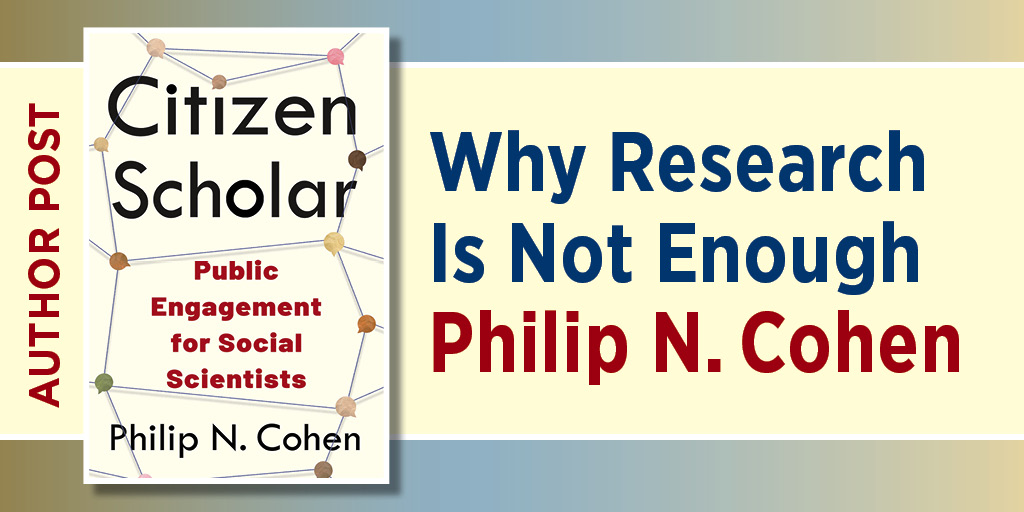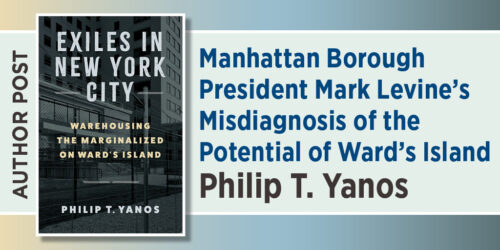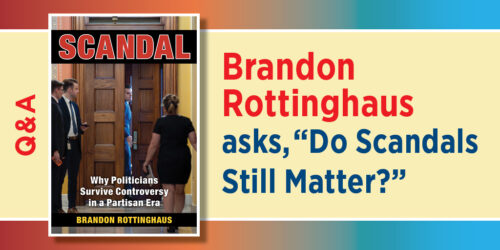Why Research Is Not Enough
Philip N. Cohen

When I joined the faculty at the University of North Carolina, the campus engagement office sent a busload of other new professors and me on a weeklong tour across the state, aiming to introduce us to our new home and show community leaders what their flagship university was doing for them. At each stop, we had a chance to tell the citizenry about the value of our work and to learn how our research might relate to local challenges and opportunities.
For some of us it was easier than for others. The sociologist studying the history of racial segregation generated a lot of interest. The biologist studying the life cycle of a remote jungle species had a little more difficulty. How is this helpful? It’s a fair question, and one that’s more important than ever.
Even among social scientists, many aren’t highly motivated to do public-facing work. They may think it too time consuming, difficult, frustrating, unsafe—or even counterproductive for their careers, compromising their image of dispassionate objectivity and harming their reputation. In an ideal world, I would say that whether to engage with the public, or its representatives in the media or government, is a career choice reasonably left to the individual scholar. In today’s world, I don’t think so.
Even among social scientists, many aren’t highly motivated to do public-facing work.
In Citizen Scholar: Public Engagement for Social Scientists, I wrote about social scientists who “do work with little direct social implication … developing research methods or conducting research on a more basic level of discovery, solving puzzles.” Such researchers aren’t in the business of agitating the public about their work. But even among those who do work with more direct social implications, there are lots of people who are reluctant to get involved—some of whom I interviewed for the book.
Citizen Scholar was finished before Trump’s reelection and the start of his new term. Since then, two things have truly struck me. The first was how many Americans literally do not know what is happening in national politics and policy. They consume news extremely selectively—mostly coverage they agree with of topics they already care about—and they distrust everything. I was aware of this trend when I wrote the book, but it’s more extreme than I realized. So that means it’s a really bad time for the second thing that surprised me: how fast and how far Trump would move against the foundations of the knowledge ecosystem, through both universities and federal agencies. These changes are structural, and the damage is already essentially permanent. It’s not just the billions of dollars and thousands of staff cut from research budgets and agencies, it’s the deeper attack on the independence of the research community. The rigorously peer-reviewed grants canceled midstream, the advisory panels fired, the cuts to research overhead funding, the political repression of international scholars—all are dismantling the capacity of the ecosystem and its institutions to promote independent discovery and generate new knowledge. Turning the system into a political tool of the administration—down to political appointees policing science in every government department—is the end of the American way of science and knowledge production as we have known it since the 1950s.
My conclusion from this is that I was too gentle in my admonishment about the necessity of social scientists speaking out. I wrote:
I hope to convince you of two things: first, that all of our work is within politics and society in the sense that the allocation of resources (including education) and the identification of problems to be solved are outcomes of socially contested processes; and second, that your work is also part of a system that needs public support and trust, which it earns by demonstrating not just its usefulness, but also its openness, transparency, and accountability. The engagement of any one research career with the public may be indirect, but it is systemic in the aggregate—through our funding, the governance of our institutions, our teaching, and our norms and standards. The responsible citizen scholar has duties and responsibilities beyond the workaday conduct of research, even if they don’t involve protest or social media. Those researchers who see themselves outside the political fray nonetheless owe the scholarly community their allegiance and support in building a knowledge system the public can get behind.
I think I was right, but this needs more urgency. Some researchers just want to do their work, and obsessive focus in that context is a feature, not a bug. But we don’t have that luxury right now. Everyone needs to find a way to express how our work matters. This doesn’t just mean writing op-eds in the national newspapers. One key lesson for the moment is the rising imperative of localness. Our universities are engines of economic activity, of course, but also centers of community and creativity in the real world all around us, not the relatively distant world of politicians and policy. In today’s information ecosystem, local embeddedness is a vital resource.
For too many, university education is an expensive gamble, accruing massive debt for uncertain benefit—and everything Trump is doing will only make that worse. The anti-elitism of the era is increasingly turning against us as intellectuals and against our often-exclusive colleges and universities. For most of us, fixing that is above our pay grade. But we can reinforce a more fundamental point: Our institutions of knowledge creation and education are essential to social flourishing at a deeper level. We want engineers who have studied Black history, historians who know math, social workers who have taken creative writing—people who are curious and generous and open minded. We need to show our communities that our work helps build that society, that we’re not just selling them a diploma and a foot in the door of their next dehumanizing workplace. I’m not the expert on exactly how to do this in your hometown, but you or someone close to you probably is, or could be.
Our spirit of exploration, our practices of openness, the diversity of opinion we embrace, and the engagement with actual people who make up our communities from the local to the global—all are essential complements to the knowledge and information we produce and disseminate, enhancing and also demonstrating the value of our work. The people who need to see this, and who need help to understand its social value, are not just in Washington or the state capital—they’re all around us. They are our students and their parents, our friends and neighbors, local activists and community leaders, members of local unions, and what’s left of our local media. We need them to see us, and to do that, we need to see and hear them too.
Philip N. Cohen is a professor of sociology at the University of Maryland and the author of Citizen Scholar: Public Engagement for Social Scientists.








